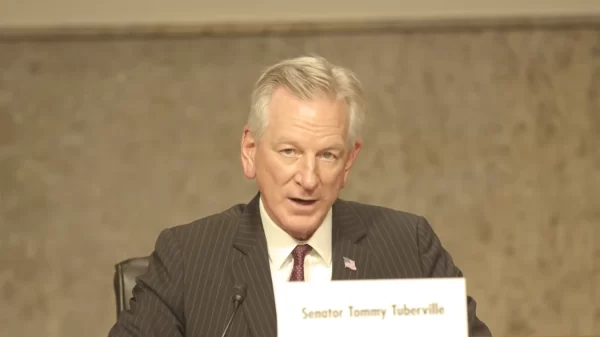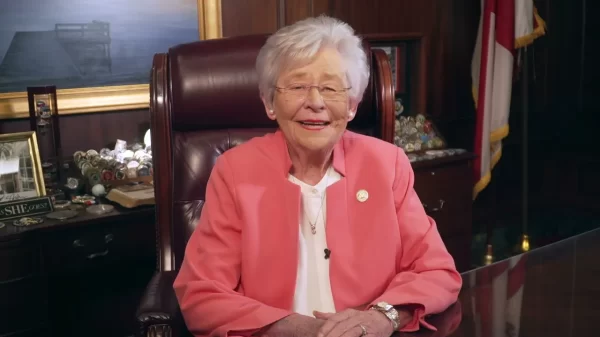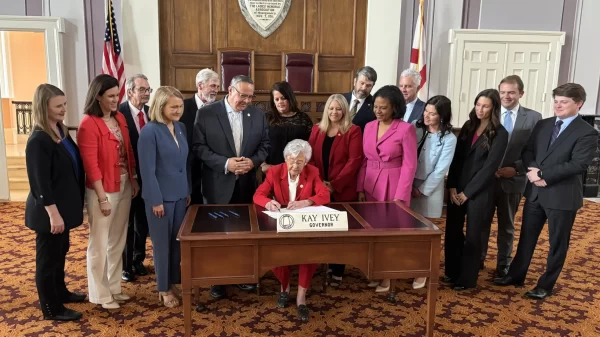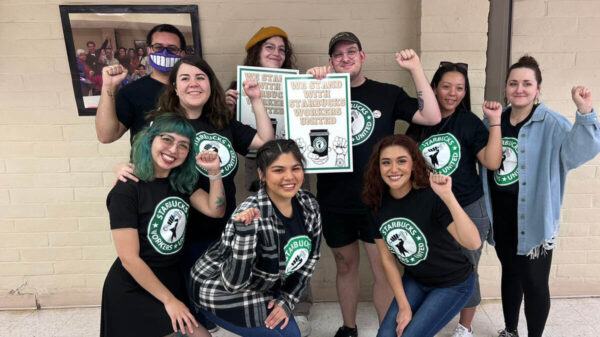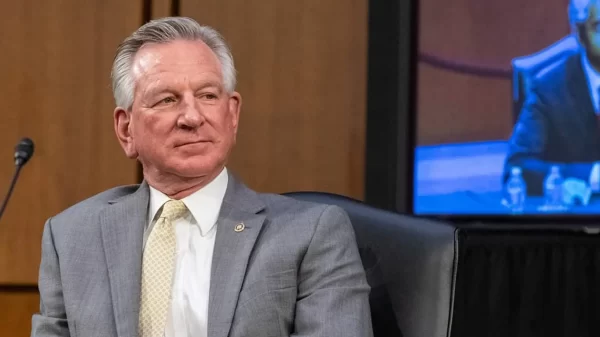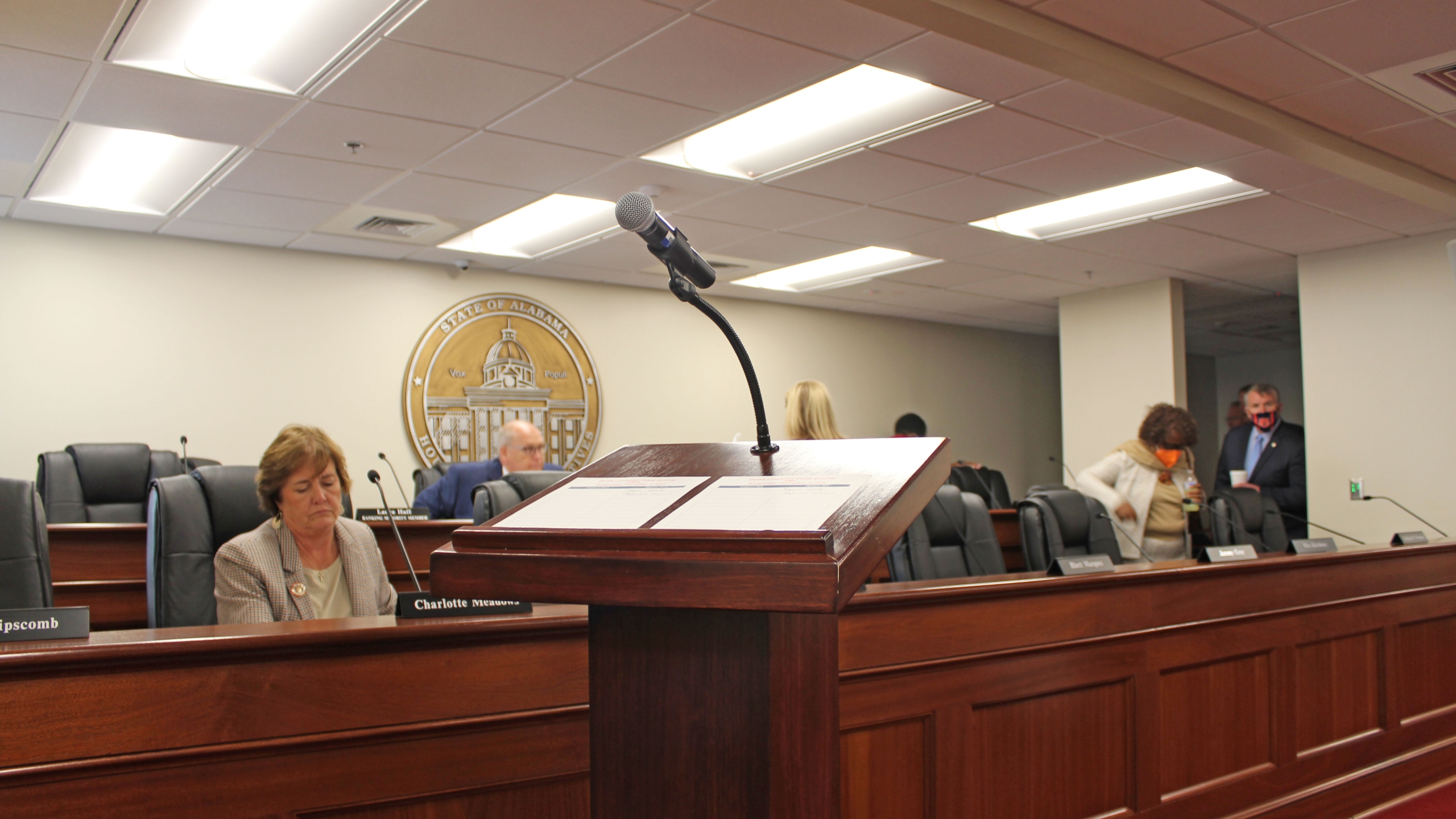A Senate bill that would require Alabama businesses to recognize medical and religious exemptions to COVID-19 vaccines was attacked from all sides Wednesday before being given a favorable report by the House Health Committee.
Rep. Mike Jones, R-Andalusia, said the opposition was “probably a sign we’re getting close to the right spot” with the bill, sponsored by Sen. Chris Elliot, R-Fairhope.
Kaycee Cavender and Stephanie Drunin, co-directors of Health Freedom Alabama, returned to the podium after sharing their opposition of SB15 to express concerns about Elliot’s bill.
“By requiring an employer to accept exemptions, you’re still not protecting employees from further discriminations such as hourly testing or weekly testing at the employee’s expense,” Cavender said. “It’s at the employer’s discretion how often they would like you to test and you have to pay for it. It’s not going to prevent you from being subjected to unfair treatment.”
Cavender also questioned the law’s lack of a stated penalty for businesses that do not comply with the exemptions and raised concerns that the bill will run into a Supremacy Clause issue and open the door to lawsuits.
Sen. Rodger Smitherman, D-Birmingham, cautioned the Senate Tuesday that the bill would run afoul of the Supremacy Clause.
Durnin said the bill “just isn’t good enough.”
“It does not protect contractors or student volunteers, it only pertains to COVID-19; it will not stand the test of time,” Durnin said.
She also said the bill had the “stench of the BCA” despite the BCA releasing a statement Tuesday criticizing the bill.
Further reinforcing that stance, interim BCA Executive Director Robin Stone came forward to share the group’s opposition to the bill.
“The current bills moving through the Legislature cause confusion and would force employers to comply with conflicting federal and state orders,” Stone said. “This legislation prevents businesses from making their own personnel decisions and put it in the hands of state government. The Legislature is constricting employers and putting current and future jobs at risk. The only way to challenge (federal vaccine mandates) is through vigorous action through the court system.”
Stone also emphasized that, for federal contractors, “compliance should not be construed as support of the federal mandate.”
“The only choice contractors have is contract forfeiture that would result in the loss of thousands of jobs,” Stone said. “They’re trying to sustain and grow jobs in their areas. They’re doing the best they can. While your concerns are sincere, I encourage you to take that into consideration.”
Stephen Morris, director of governmental affairs for the Alabama Department of Labor, argued that the department should not be involved in the review of the exemptions.
“We are in the business, once employer and employee are separated in some way, making sure benefits are decided upon in some fair manner,” Morris said. “(Under this bill) we’re now a party to the separation. That’s just not how we’re set up and not what we’re meant to do. We would like to be taken out of this bill completely.”
Margaret Clark said she had not seen the newest version of the bill and therefore could not “intelligently comment” on it, but shared her opinion to the committee that federal vaccine mandates are a “figment of our imagination,” referencing the attorney general of Alabama’s complaint and calling the process of establishing the mandates illegal.
Jones said the bill is an attempt to address the concerns of employees without affecting businesses negatively.
“We’re finding a way we can protect the jobs of individuals and not lose federal contracts,” Jones said. “That’s the effort that’s been done.”
The bill includes several different medical exemptions for an employee to choose from:
- “My health care provider has recommended that I not take the COVID-19 vaccine based on my current health conditions and/or medications.
- “I have previously suffered a severe allergic reaction related to vaccinations or similar injections or medications.
- “I have been diagnosed with COVID-19 in the past 12 months.
- “I am immunocompromised such that receiving the COVID-19 vaccine creates a risk to my health.
- “I have another health condition that prevents me from receiving the COVID-19 vaccine. (Attach any relevant information.)”
The sole line for religious exemption reads “I am requesting exemption from the COVID-19 vaccine requirements for sincerely held religious beliefs.”
Jones said he could “absolutely not” give a definition for “sincerely held religious beliefs” and said employers and federal courts have typically not delved into those types of exemptions.
Outside of the one line that asks for attaching relevant information, it appears no vetting can be done of the exemptions.
“A completed, submitted form is the standard,” Jones said. “If there were a challenge, it creates a presumption the employee is entitled to the exemption. The employer must file an appeal. The only issue in review is whether a completed form is submitted. Protections are construed in favor of the employee.”
Rep. Joe Lovvorn, R-Auburn, expressed concern that the bill is a “state overreach” in reaction to a “federal overreach.”
“Each time the government involves itself in my business, it doesn’t help me and it doesn’t help my customer,” Lovvorn said. “What I see as an employer is it’s hard enough to punish someone for not working. … I hope we don’t overreach as a state. We’re building that dam in the wrong place, I’m concerned.”
Rep. Laura Hall, D-Huntsville, expressed concerns that the bill would add more responsibility on ADOL without including any funding mechanism.
Jones suggested the route to take would be introducing funding through supplemental legislation in the regular session.
“(American Rescue Plan) funding could be used to fund this kind of process,” Jones said. “At this time I would recommend using that funding to help handle this situation.”
Jones said the form would give businesses something to point to as to why they kept on unvaccinated employees.
“It’s something employers can put in the file to support their decision to keep an employee,” Jones said. “The ones who would have the most problem with this are federal contracts. There’s no effort to hide all that.”
If passed by the House in its current form, Jones said the bill would become law immediately upon the signature of Gov. Kay Ivey.




